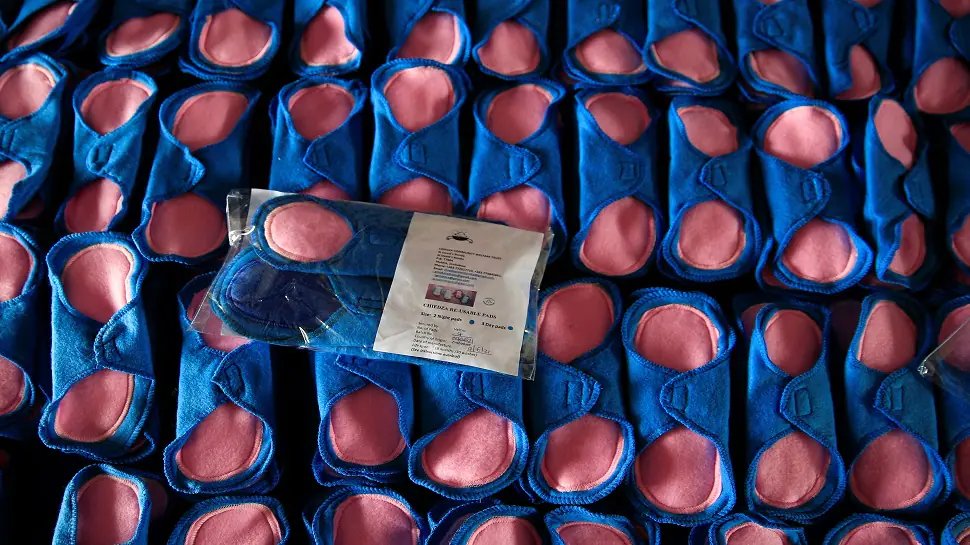New Delhi: Reshma, a resident of a slum in South Delhi, often wondered how sanitary napkins are made. Her inquisitiveness further increased when she learnt that menstrual pads can be made using natural products instead of plastic. Now further into her exploration, she works at a unit manufacturing “reusable and environment-friendly” pads invented by a group of Jamia Millia Islamia (JMI) students.
The unit is spearheading a change in a locality in Madanpur Khadar’s Shram Vihar where women do not talk about “lady’s problems” in front of men, let alone manufacture sanitary products under their guidance.
“When bhiaya and didi came, we were very shy to speak about period in front of them but once we saw videos and learnt more about it, we became quite comfortable. Now I work on a hydraulic press which is used to prepare napkin core and I have become good at it,” Reshma (35), who is one of the six women workers in the unit, said.
Shrimati napkin, which is prepared using bamboo and banana fibres, is reusable, environmentally friendly and can last for over a 12-period cycle, claim its inventors.
ALSO READ- I-Day 2022: Only few can score 10/10 in this quiz on India – Dare to try?
The JMI students who are associated with Student Organisation Enactus Jamia Millia Islamia started working on the idea of reusable pads in 2019 and it took them over a year to finalise the product.
These napkins appear like typically reusable pads at first glance but what separates them from other similar products is the raw material.
The first layer is made of polar fleece and another layer of lycra. The absorbing part is composed of banana and bamboo fibres, which the students claim are their unique selling points (USP).
ALSO READ- SSC Recruitment 2022: Apply for JE posts, check salary, eligibility & more
“We had four failed prototypes before reaching the final product. It took a lot of research and hard work to finally reach the final product. In the core, we have banana and bamboo fibres. The bamboo fibre is the core absorbent part of the napkin. The banana fibre gives it a structure and also has anti-bacterial properties,” said Maham Sidique, Enactus vice president.
After finalising the product, the production of the napkins was the next task. Three customised machines were required and to get them, the students needed money.
So they turned to multinational companies for donations. After presenting their ideas to several companies, the students were able to secure funding of over Rs 2.5 lakh.
“After finalising the product the major task was to buy customised machines. We got funding for machines as part of the CSR activities of a multinational company and got it fitted in the silai centre run by an NGO and started the production of the product,” Enactus president and third-year JMI student Gaurav Chakraborty said.
Around 22 students are engaged in the Shrimati project. The group has been sub-divided into teams of three-four students. A team handles production, while another takes care of marketing and so on.
The students said they believe that their efforts would break the shackles and taboos around menstruation.
It includes providing a “better” alternative to expensive napkins and employing underprivileged women in units manufacturing these napkins. The women are paid Rs 25 per pad.
The women at Shram Vihar unit started production in August last year and have so far manufactured over 1,200 pads. Recently, they also received product approval from a government-approved laboratory.
“Through project Shrimati, we strive for a sustainable future whilst assisting our women community to become self-sufficient and financially independent. Thus, Shrimati is set to become stronger, attributing to its infallible design, feasibility and scalability,” Chakraborty said.
Reshma, who is a mother of three, live across the makeshift production centre. She comes at the unit every day to learn to tailor and prepare pads.
The centre, where other tailoring works are also carried out, has provided an additional source of income for dozens of these underprivileged women.
“It helps in passing time and we also learn skills. I use Shrimati napkins only. We used to rely on pads from outside but they are quite expensive and disposing of them was always an issue,” Reshma said.
Similarly, Aliya (name changed), who has recently completed Class 10, has learnt multiple skills at the centre.
“I become part of the project a few months ago. I also use the product and I am happy with the result. The work gives me an alternate source of income,” Aliya said,
The Jamia students are hopeful to enter the market in the next months. They are raising funds through multiple sources –fundraisers, participating in competitions as well as depending on CSR of companies.
“We are targeting the environment-conscious college goers. Another target audience for us is the rural population who cannot afford sanitary napkins and don’t have better alternatives. We are hoping that our product will excel there as well,” Chakraborty said.
The students are also carrying out many donation drives to raise awareness about their product as well as menstrual health.
